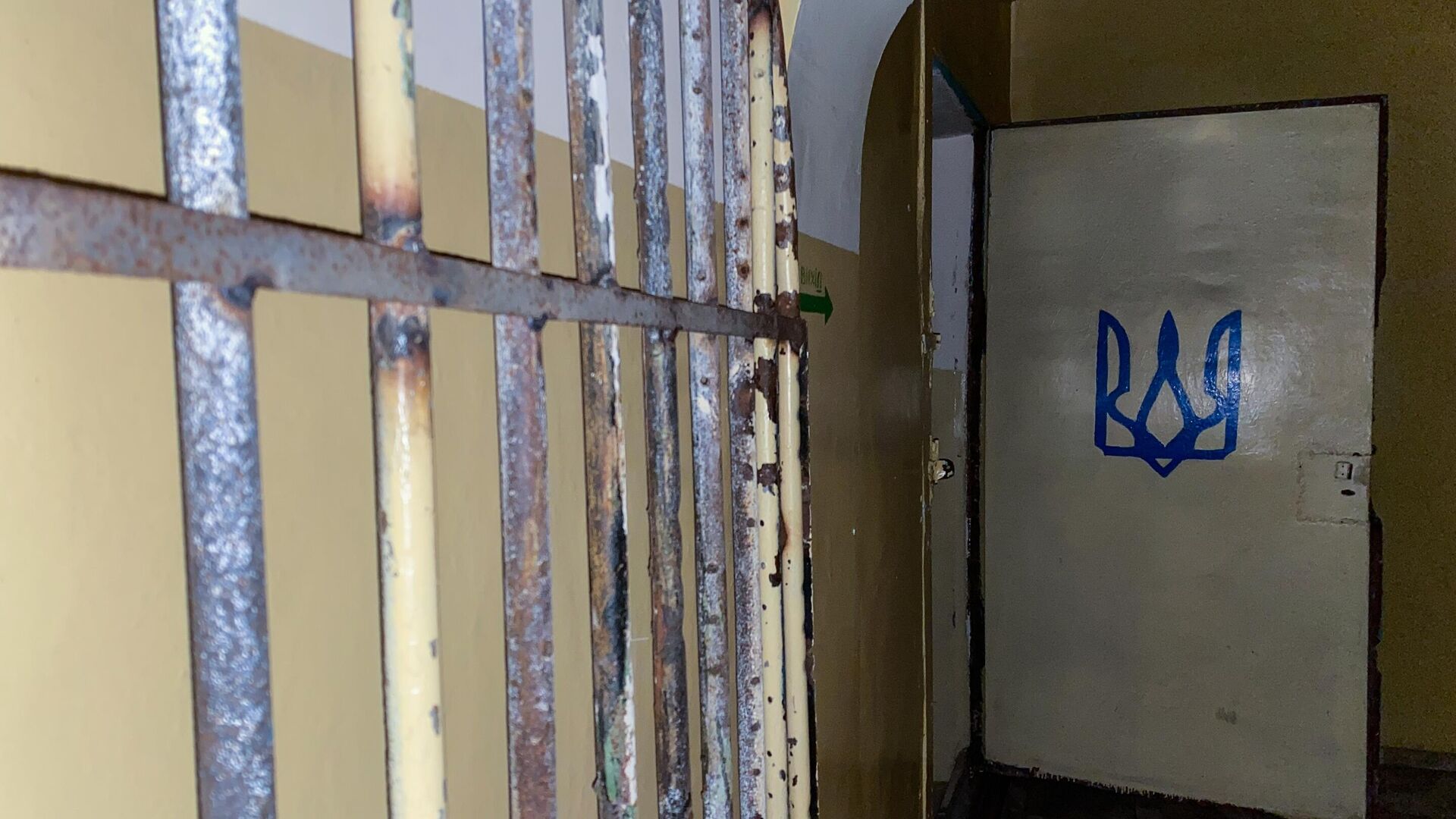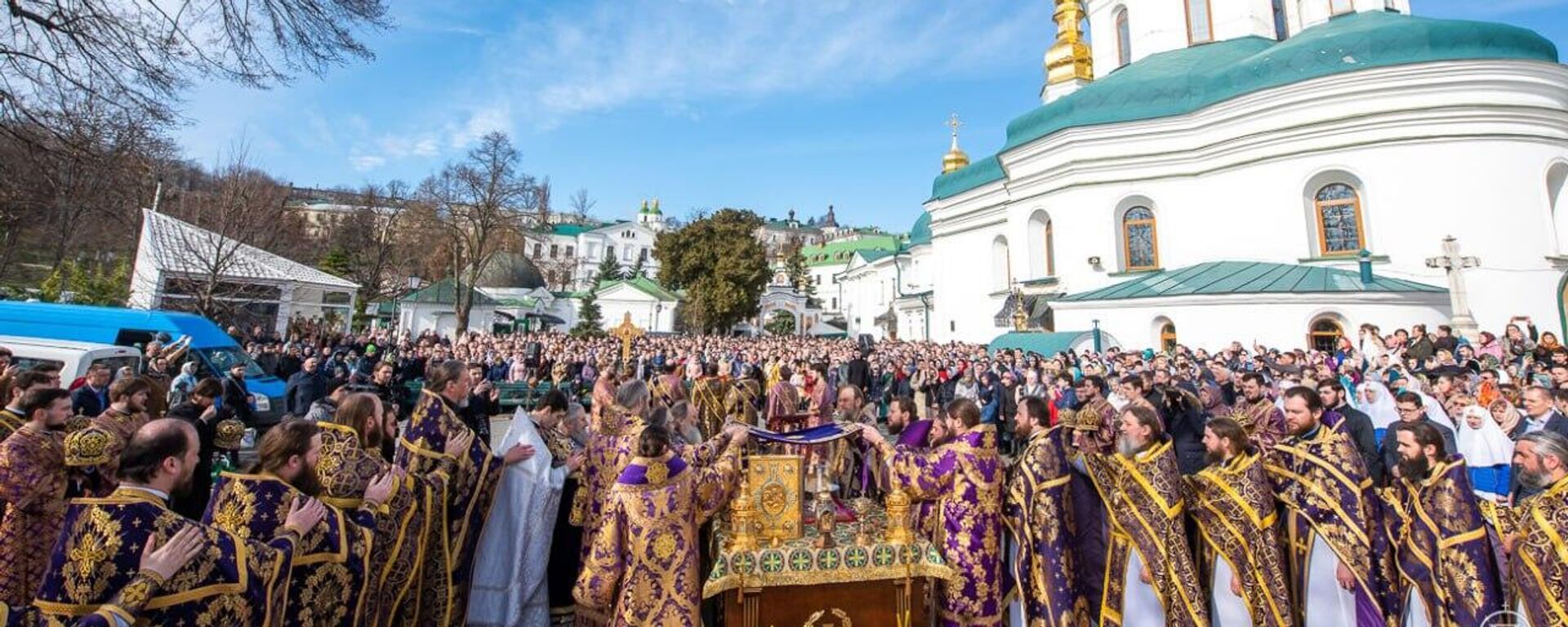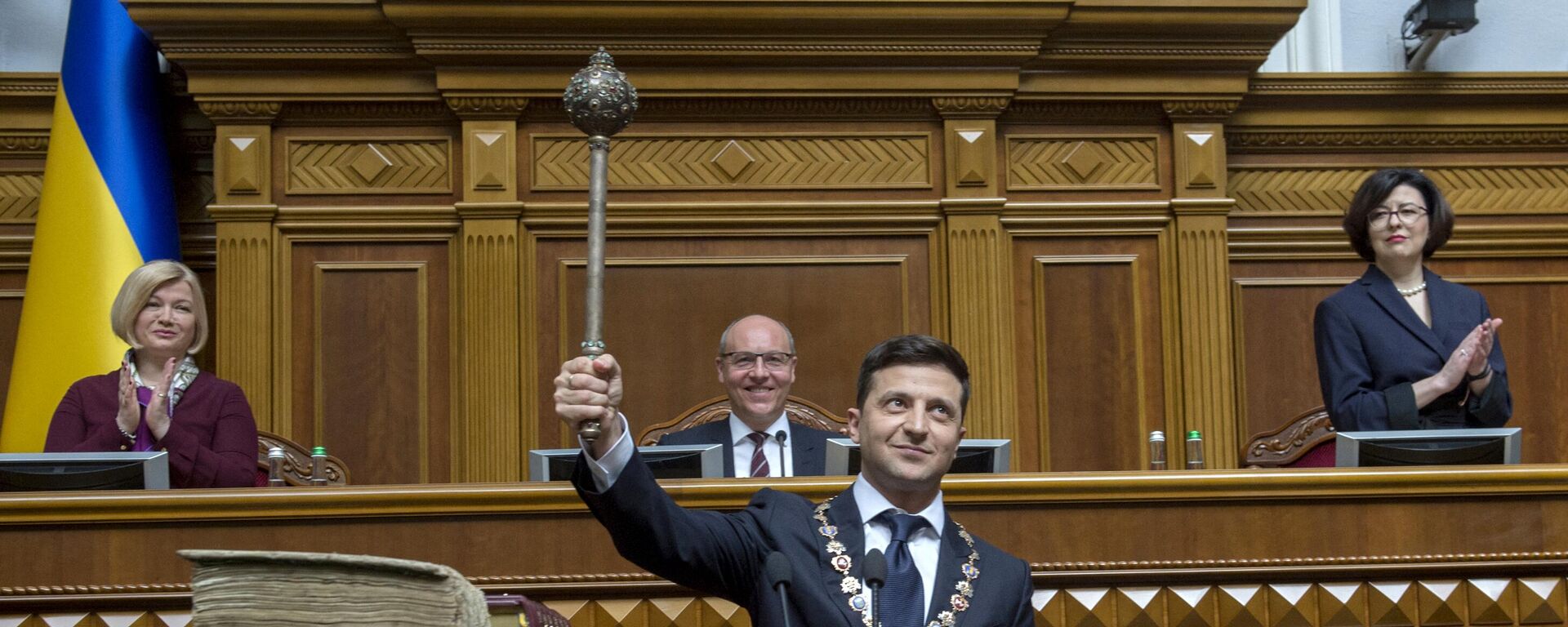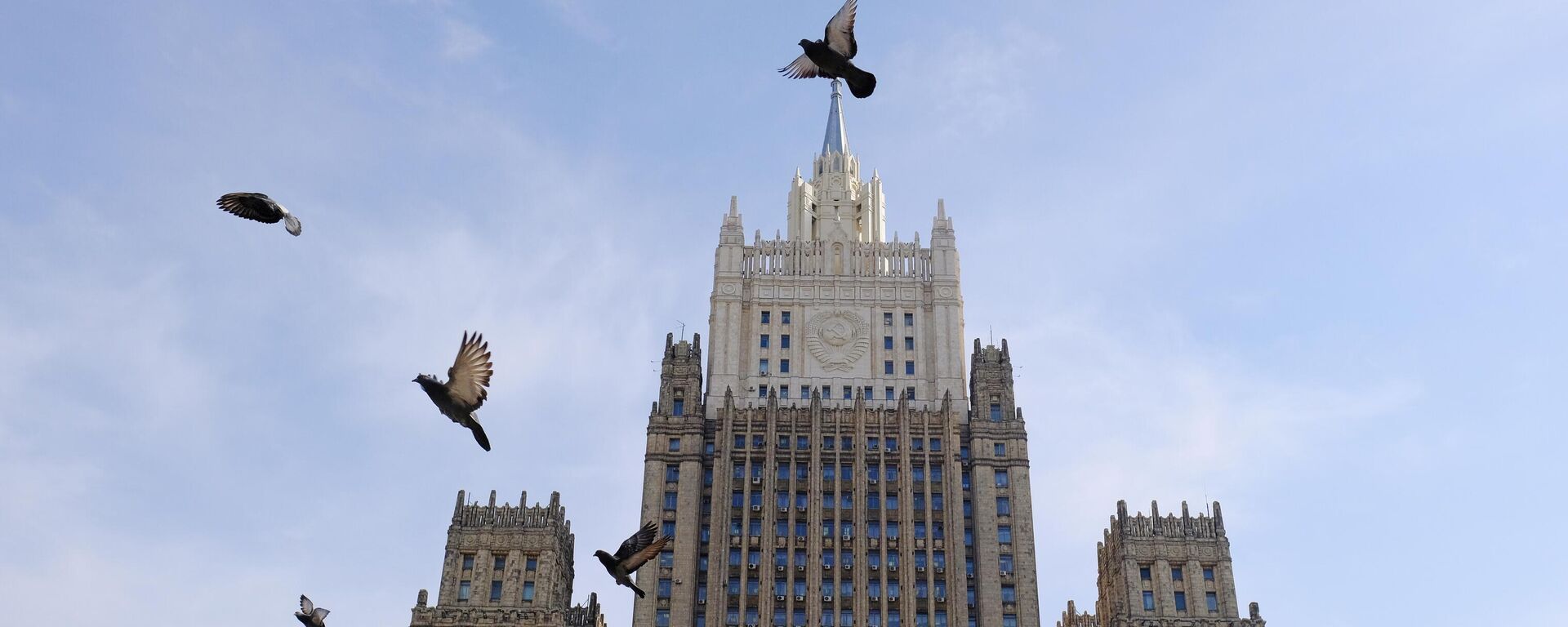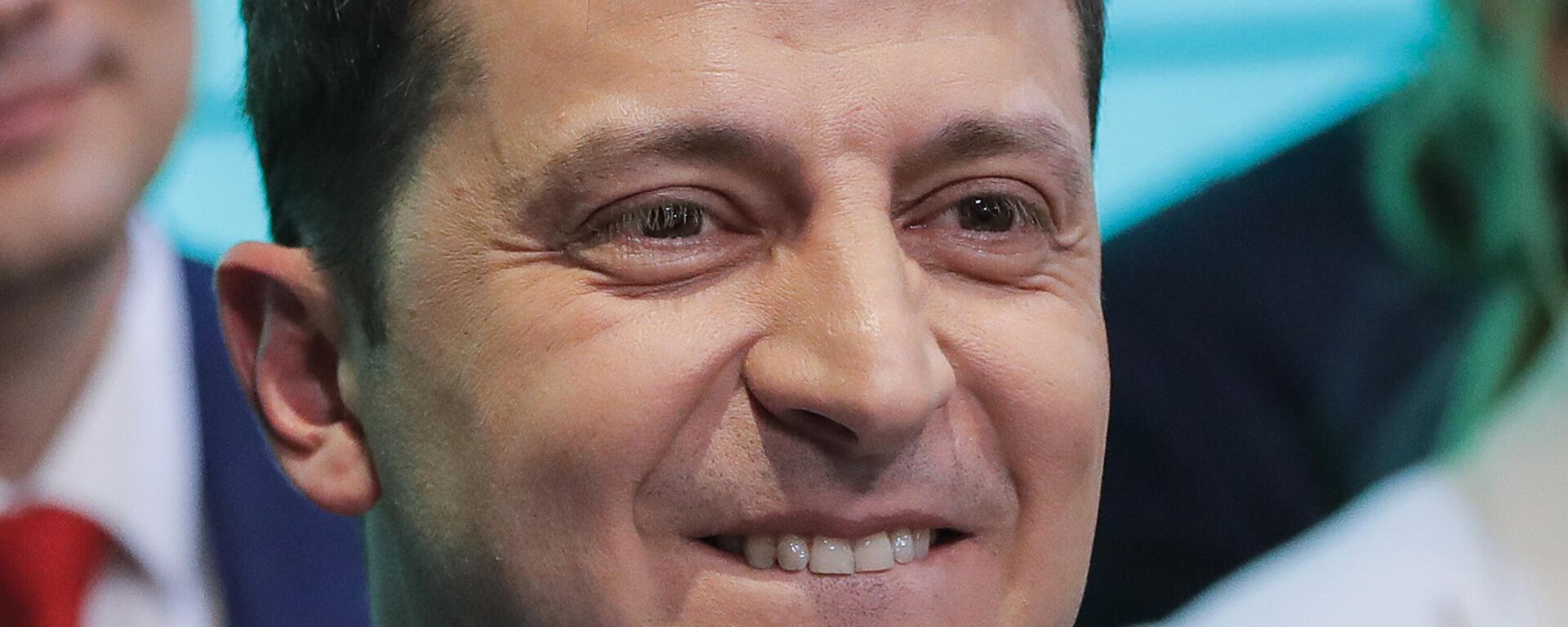https://sputnikglobe.com/20240429/ukraine-continues-assault-on-human-rights-as-western-media-turns-blind-eye--1118175268.html
Ukraine Continues Assault on Human Rights as Western Sponsors Turn a Blind Eye
Ukraine Continues Assault on Human Rights as Western Sponsors Turn a Blind Eye
Sputnik International
President Biden has touted the NATO-Russia proxy war in Ukraine as a “battle between democracy and autocracy,” overlooking Kiev’s backsliding on elections (which have been canceled), and political, speech and religious rights and freedoms (which have been curtailed). Now, observers fear that an even more severe clampdown may be on the horizon.
2024-04-29T12:33+0000
2024-04-29T12:33+0000
2024-04-29T13:33+0000
analysis
vladimir yevseyev
volodymyr zelensky
joe biden
ukraine
russia
state department
council of europe
european convention on human rights
https://cdn1.img.sputnikglobe.com/img/07e8/04/1d/1118178034_0:215:2878:1834_1920x0_80_0_0_552c05326627456852d00fc66d087dbf.jpg
The Ukrainian government has updated its European colleagues on the terms of its partial suspension of Ukraine’s adherence to the European Convention on Human Rights and the International Covenant on Civil and Political Rights.In a "Notification of Partial Withdrawal of Derogation" notice dated April 4, 2024 and published on the Council of Europe’s website, Ukraine’s permanent representation to the Council of Europe informed its colleagues about “the derogation measures” (i.e. exemptions) from its international commitments on human, civil, political, religious, and labor rights in connection with the martial law measures enforced across the country.The notice reviewed Ukrainian authorities’ February 2022 decision to partially or fully suspend a number of rights under the country’s constitution, including:In connection with the introduction of martial law, the state granted itself the right:The notification to the Council of Europe was accompanied by an extract from "On the Legal Regime of Martial Law" legislation of May 12, 2015 (one year into the conflict in Donbass), which established the “temporary restrictions on constitutional rights and freedoms of a person and a citizen” outlined above, as well as additional measures, including:Kiev submitted its initial derogation to European and international human, civil, and political rights conventions in March of 2022 – about a month after the escalation of the crisis in Donbass into a full-fledged NATO-Russia proxy war across the whole of Ukraine.Russian and international observers, human rights organizations, and the Office of the United Nations High Commissioner for Human Rights have pointed to an alarming uptick in human, civil, and political rights violations in Ukraine over the past two years – from the banning of political parties deemed disloyal to the Zelensky regime, to the cancellation of elections, the persecution of the Ukrainian Orthodox Church, arbitrary detentions, forced disappearances, torture, and other abuses.In March, a US State Department report outlined “significant human rights issues involving Ukrainian government officials,” ranging from “enforced disappearance, torture and cruel, inhuman, or degrading treatment or punishment, harsh and life-threatening prison conditions, arbitrary arrest or detention,” and more.“Some of these human rights issues stemmed from martial law,” the State Department report indicated, adding that “the government often did not take adequate steps to identify and punish officials who may have committed abuses.”Threat to Itself and Neighbors“Gross violation of human rights” are being committed at the hands of Ukraine’s authorities and its military affecting not only the country itself, but its neighbors as well, says Vladimir Yevseyev, a Russian military analyst from the Moscow-based Institute of Commonwealth of Independent States.More interesting than the violations themselves is the reaction of Kiev’s Western curators, the observer argues.Pointing to the State Department report on “significant human rights issues involving Ukrainian government officials,” Yevseyev suggested that it may indicate “some kind of internal political struggle” within the Washington establishment “against the backdrop of the election campaign,” and perhaps part of a general “internal political interdepartmental struggle” as the extent of Kiev’s violations becomes increasingly difficult to conceal.Accordingly, Yevseyev doesn’t rule out that Kiev may have decided to update its exemptions from European and international human, civil, and political rights conventions to counter this criticism, citing the excuse of the ongoing war effort.The decision to update the list of derogation measures is also likely connected to the extensive factual basis presented to international organizations on the violations taking place in Ukraine.“Everyone knows,” for example, “how many people are in prison on politically motivated charges,” Yevseyev noted, saying this is “getting harder and hider to hide.” Accordingly, the partial derogation allows Ukraine to avoid legal reproach.As for the implications of Kiev’s moves, and whether they will lead to a further deterioration of human, civil and political rights in Kiev, Yevseyev believes it will make little difference so long as Ukraine’s European and American sponsors continue to cover for them, and continue to prop up the Zelensky regime.The observer expects the situation to continue to deteriorate along with the deterioration of the socio-economic situation in Ukraine, and doesn’t rule out growing violence as ordinary Ukrainians fight back against the state – for example by killing officials from recruitment offices after the expansion of forcible mobilization measures.
https://sputnikglobe.com/20240422/tucker-carlson-says-confronted-speaker-johnson-about-persecution-of-christians-in-ukraine-1118066172.html
https://sputnikglobe.com/20240415/political-clown-zelensky-may-be-ukraines-last-president---ukrainian-politician-1117946593.html
https://sputnikglobe.com/20240402/russia-reiterates-call-on-intl-organizations-to-conduct-probe-into-bucha-events-1117693981.html
https://sputnikglobe.com/20240220/ukraine-had-secret-torture-chambers-burials-in-aveyevka-1116886236.html
https://sputnikglobe.com/20240331/free-and-transparent-election-in-ukraine-would-have-been-disaster-for-zelensky-1117674979.html
ukraine
russia
Sputnik International
feedback@sputniknews.com
+74956456601
MIA „Rossiya Segodnya“
2024
News
en_EN
Sputnik International
feedback@sputniknews.com
+74956456601
MIA „Rossiya Segodnya“
Sputnik International
feedback@sputniknews.com
+74956456601
MIA „Rossiya Segodnya“
what is human rights situation in ukraine, does ukraine have problems with human rights
what is human rights situation in ukraine, does ukraine have problems with human rights
Ukraine Continues Assault on Human Rights as Western Sponsors Turn a Blind Eye
12:33 GMT 29.04.2024 (Updated: 13:33 GMT 29.04.2024) President Joe Biden has touted the NATO-Russia proxy war in Ukraine as a “battle between democracy and autocracy,” overlooking Kiev’s backsliding on elections (which have been canceled), and political, speech, and religious rights and freedoms (which have been curtailed). Now, observers fear that an even more severe clampdown may be on the horizon.
The Ukrainian government has updated its European colleagues on the terms of its partial suspension of Ukraine’s adherence to the European Convention on Human Rights and the International Covenant on Civil and Political Rights.
In a "Notification of Partial Withdrawal of Derogation"
notice dated April 4, 2024 and published on the Council of Europe’s website, Ukraine’s permanent representation to the Council of Europe informed its colleagues about “the derogation measures” (i.e. exemptions) from its international commitments on human, civil, political, religious, and labor rights in connection with the martial law measures enforced across the country.
The notice
reviewed Ukrainian authorities’ February 2022 decision to partially or fully suspend a number of rights under the country’s constitution, including:
guarantees on the inviolability of the home, the rights to privacy in communications, non-interference in personal and family life, freedom of movement, freedom of choice of place of residence;
the right to freely leave and enter Ukraine, freedom of thought and speech, the right to free expression, the right to collect, store, use, and disseminate information, the right to participate in the management of public affairs and referendums, to freely elect and be elected to state and local bodies, to receive equal access to public services;
the right to hold meetings, rallies, marches, and demonstrations, the right to strike, the right to own, use, and dispose of property, the right to entrepreneurship and work, and the right to education.
In connection with the introduction of martial law, the state granted itself the right:
“to compulsorily alienate privately or communally owned property for the needs of the state”;
“to introduce curfew (a ban on staying on the streets and in other public places during certain periods of time without specially issued passes and certificates)”;
“to establish a special regime of entry and exit in accordance with a certain procedure, to restrict the freedom of movement of citizens, foreigners and stateless persons, as well as the movement of vehicles”;
“to inspect the belongings, vehicles, baggage and cargo, office premises and homes of citizens”;
“to prohibit peaceful assemblies, rallies, marches, demonstrations and other mass events”;
“to establish in accordance with a certain procedure, a ban or restriction on the choice of place of stay or place of residence in the territory where martial law is in force”;
“to prohibit citizens registered with the military or special registry to change their place of residence (place of stay) without proper permission”;
The notification to the Council of Europe was accompanied by an extract from "On the Legal Regime of Martial Law" legislation of May 12, 2015 (one year into the conflict in Donbass), which established the “temporary restrictions on constitutional rights and freedoms of a person and a citizen” outlined above, as well as additional measures, including:
forcible “labor duty for able-bodied persons not involved in defense and critical infrastructure protection and not reserved for enterprises, institutions and organizations for the period of martial law in order to perform defense-related work and to eliminate the consequences of emergencies that occurred during the period of martial law”;
the right of the state “to use the capacities and labor resources of enterprises, institutions and organizations of all forms of ownership for defense purposes, change their working hours, and make other changes to production activities and working conditions in accordance with labor legislation”;
the power “to compulsorily alienate privately or municipally owned property, seize property of state-owned enterprises and state economic associations for the needs of the state under martial law”;
the authority “to raise the issue of banning the activities of political parties and public associations in accordance with the procedure established by the Constitution and laws of Ukraine, if they are aimed at eliminating the independence of Ukraine”;
the right of authorities “to set restrictions on electronic communications, print media, publishing houses, broadcasters, and other cultural and media institutions, and enable their use “for military needs and for conducting explanatory work among the military and the population”;
the power “to establish a special regime in the field of the production and sale of medicinal products containing narcotic drugs, psychotropic substances and precursors, other potent substances, the list of which is determined by the Cabinet of Ministers of Ukraine”;
the right of the state to “intern (forcibly settle) citizens of a foreign state that threaten to attack or carries out aggression against Ukraine”;
In practice, the extensive suspension of civil, political, religious, property, and other rights means that the Ukrainian government has granted itself virtually unlimited authority to seize property, listen in on private conversations with loved ones, restrict freedom of movement (particularly for males aged 18-60), detain people indefinitely without charge, and interfere with people's rights to freedom of speech, assembly, and even worship.
Kiev submitted its initial derogation to European and international human, civil, and political rights conventions in March of 2022 – about a month after the escalation of the crisis in Donbass into a full-fledged NATO-Russia proxy war across the whole of Ukraine.
The update submitted in April formally repeals the derogation on articles related to forced labor, arbitrary detention, freedom of thought, conscience, and religion, and the freedom of peaceful assembly, but the others remain in place.
Russian and international observers, human rights organizations, and the Office of the United Nations High Commissioner for Human Rights have pointed to an
alarming uptick in human, civil, and political rights violations in Ukraine over the past two years – from the
banning of political parties deemed disloyal to the Zelensky regime, to the
cancellation of elections, the
persecution of the Ukrainian Orthodox Church, arbitrary detentions, forced disappearances, torture, and other abuses.
In March, a US State Department report outlined “significant human rights issues involving Ukrainian government officials,” ranging from “enforced disappearance, torture and cruel, inhuman, or degrading treatment or punishment, harsh and life-threatening prison conditions, arbitrary arrest or detention,” and more.
The report highlighted “serious problems with the independence of [Ukraine’s] judiciary, restrictions on freedom of expression, including for members of the media, including violence or threats of violence against journalists, unjustified arrests or prosecutions of journalists, and censorship, serious restrictions on internet freedom, substantial interference with the freedoms of peaceful assembly and associated, restrictions on freedom of movement, serious government corruption, extensive gender-based violence, systematic restrictions on workers’ freedom of associated, and the existence of the worst forms of child labor.”
“Some of these human rights issues stemmed from martial law,” the State Department
report indicated, adding that “the government often did not take adequate steps to identify and punish officials who may have committed abuses.”
Threat to Itself and Neighbors
“Gross violation of human rights” are being committed at the hands of Ukraine’s authorities and its military affecting not only the country itself, but its neighbors as well, says Vladimir Yevseyev, a Russian military analyst from the Moscow-based Institute of Commonwealth of Independent States.
“The latest vivid example of this is the murder of civilians in Avdeyevka. During demining operations, the bodies of civilians were found with their hands tied behind their backs with tape. They were all killed. This example shows the true state of the observance of human rights in Ukraine, their military’s crimes. Therefore, there isn’t even anything to discuss here,” Yevseyev told Sputnik.
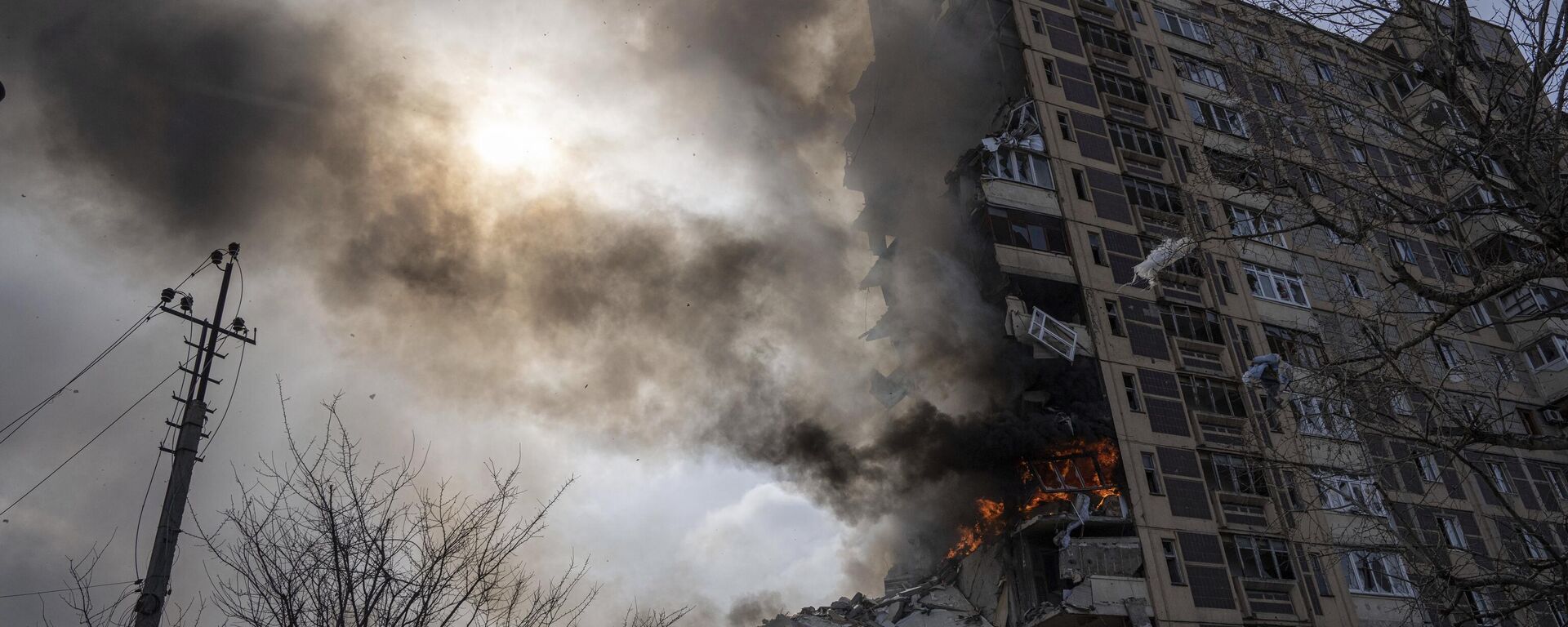
20 February 2024, 09:24 GMT
More interesting than the violations themselves is the reaction of Kiev’s Western curators, the observer argues.
Pointing to the State Department report on “significant human rights issues involving Ukrainian government officials,” Yevseyev suggested that it may indicate “some kind of internal political struggle” within the Washington establishment “against the backdrop of the election campaign,” and perhaps part of a general “internal political interdepartmental struggle” as the extent of Kiev’s violations becomes increasingly difficult to conceal.
Accordingly, Yevseyev doesn’t rule out that Kiev may have decided to update its exemptions from European and international human, civil, and political rights conventions to counter this criticism, citing the excuse of the ongoing war effort.
In any case, the observer no doubt that the Ukrainian state and military will continue to do what they have been doing, and that Kiev’s sponsors “will continue to turn a blind eye to all the violations that took place, at least before the presidential election” in the US, which will play the decisive role.
The decision to update the list of derogation measures is also likely connected to the extensive factual basis presented to international organizations on the violations taking place in Ukraine.
“Everyone knows,” for example, “how many people are in prison on politically motivated charges,” Yevseyev noted, saying this is “getting harder and hider to hide.” Accordingly, the partial derogation allows Ukraine to avoid legal reproach.
As for the implications of Kiev’s moves, and whether they will lead to a further deterioration of human, civil and political rights in Kiev, Yevseyev believes it will make little difference so long as Ukraine’s European and American sponsors continue to cover for them, and continue to prop up the Zelensky regime.
“The situation can be radically changed only through a change of regime. [The Zelensky] regime is totalitarian. Violations of human rights are the norm of behavior, rather than something provocative. The West, naturally, cannot admit that the regime is totalitarian. Therefore, they are forced to turn a blind eye to the massive violations of human rights that are taking place,” Yevseyev said.
The observer expects the situation to continue to deteriorate along with the deterioration of the socio-economic situation in Ukraine, and doesn’t rule out growing violence as ordinary Ukrainians fight back against the state – for example by killing officials from recruitment offices after the expansion of forcible mobilization measures.
